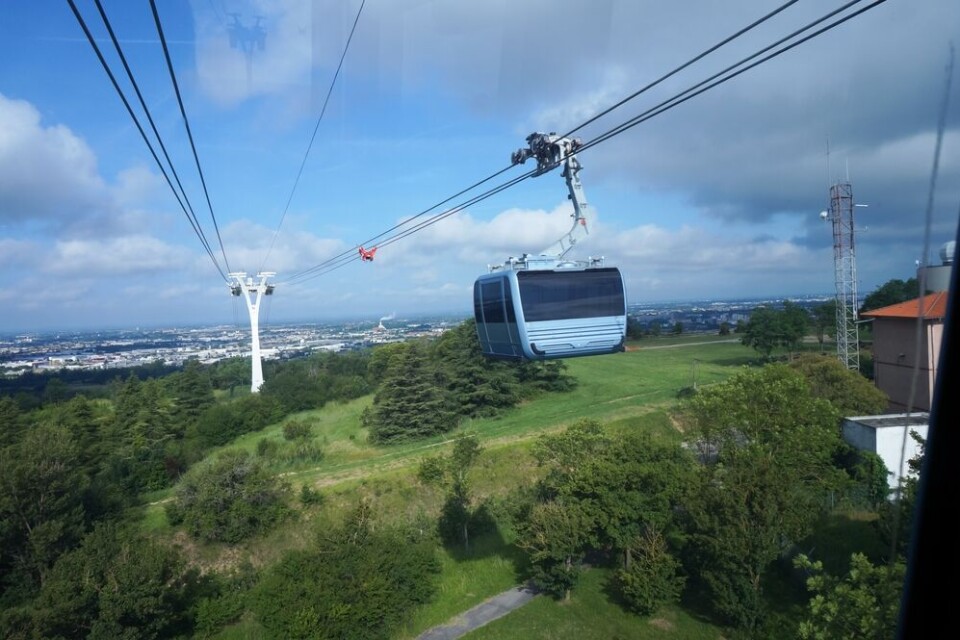-
Study ranks best - and worst - French airports for flight punctuality
The global ranking also looked at customer service and food and shopping facilities
-
Why it is becoming harder to park in urban areas in France
A new law is set to come into force this year
-
Law proposal: commercial flights banned at night in Toulouse
Initiative seeks to reduce local noise pollution
Toulouse cable car system celebrates two million trips
But critics say that the €93million project has fallen short of its targets as the ‘novelty’ wears off

The cable car system in Toulouse has hit the two-million trip mark, just over 15 months since it began operating.
The téléphérique system, named Téléo, opened on May 14, 2022. One year after opening, it had completed 1.5 million trips, and on Sunday, September 3, it passed the two-million threshold.
Operator Tisséo said that half of these trips were for people making “daily journeys”.
Jean-Michel Lattes, chairman of Tisséo Collectivités et Ingénierie, told regional newspaper La Dépêche: "Today, we have 6,000 journeys a day on weekdays and 4,500 at weekends. We had set a target of 7,000 journeys a day, but that included the development of the Linéo 7 line, which is almost done.
“That's when we'll see whether our forecasts are accurate. For the time being, it’s a system that has become an integral part of the network.”
Writing on X, formerly Twitter, he said: “This transport tool is now well-embedded in the daily life of Toulousains.”
Ce dimanche Teleo a dépassé les 2 millions d'usagers. Cet outil de mobilité est désormais bien inscrit dans la vie quotidienne des toulousains. pic.twitter.com/5ViPtR1Z9g
— LATTES Jean-Michel. (@jmlattes) September 3, 2023
‘The novelty is over’
But some opponents to the transport system have criticised the company for failing to hit its targets despite the project’s €93million budget.
“The first million passengers in 227 days, the second million in 250 days,” wrote one environmental campaigner, Arnaud Rivière, on X. “Once the novelty is over, the momentum drops to 4,000 passengers a day.”
#toulouse #teleo 🚡
— Arnaud RIVIERE (@Orna) September 4, 2023
▶️1er million de passagers en 227 jours (inauguration du 14.05.2022 au 27.12.2022)
▶️2nd million de passagers en 250 jours (28.12.2022 au 03.08.2023)
Passé l'effet découverte, le soufflet retombe à 4000 passagers/jour. https://t.co/Ao4QqDE9Px
But Mr Lattes defended the project, saying that usage would pick up over time.
He said: “At the beginning, the passenger figures were lower than they are today. You always hold out hope for the maximum at the beginning. [But gradually] we've seen a leisure effect developing at weekends, with people taking their bikes up to [hilltop park] Pech-David, for example."
It is hoped that the cable car will continue to offer an alternative form of transport for tourists and locals during major events, such as during the current Rugby World Cup (for which France is the host nation).
Plans for an extension to the cable car’s network are still in the pipeline, Mr Lattes added.
"We have already taken steps to ensure that there is no construction on the stretch of line that could be built between the [local areas] Oncopole and Basso-Cambo, the Paul-Sabatier University and Montaudran.
He explained that when the cable car was built, “there was a clause requiring the stations to be built before the extension could be built”.
Yet, definite plans for an extension have so far not been confirmed.
Related articles
Upwardly mobile: Cable cars and the ‘new French cities of tomorrow’
























